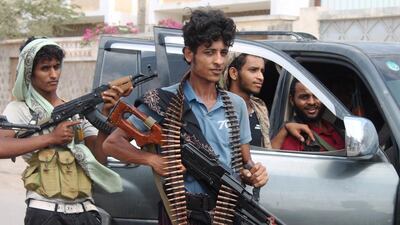ADEN // Aircraft from the Saudi-led coalition pounded Iran-allied Houthi militiamen and rebel army units in central Yemen and the capital Sanaa on Monday, as the humanitarian crisis worsened with hold-ups in the delivery of aid .
Residents said warplanes flew between 15 and 20 sorties against groups of Houthi fighters and arms depots in the Dhalea provincial capital, Dhale, and the nearby city of Qa’ataba, in the morning, setting off a chain of explosions that lasted for two more hours.
Fighting intensified on Sunday, after a lull following an announcement by Riyadh last week that it was ending its nearly five-week-old bombing campaign except in places where the Houthis were advancing.
The foreign ministers of Saudi Arabia and the five other GCC countries will discuss the war in Yemen at a meeting in Riyadh on Thursday, the bloc’s chief said.
The meeting in the Saudi capital Riyadh would cover “issues vital to the operations of the Gulf Cooperation Council and developments in the region, including the crisis in Yemen,” GCC secretary general Abdullatif Zayani said on Monday.
All members of the GCC except Oman are taking part in the Saudi-led coalition.
The coalition of Arab countries is trying to stop Houthi fighters and loyalists of former president Ali Abdullah Saleh taking control of Yemen after forcing the internationally recognised president, Abdrabu Mansur Hadi, to flee the country.
The coalition has been backed by the United States, and the US secretary of state John Kerry on Monday said he would use a meeting with the Iranian foreign minister in New York later in the day to urge Tehran push the Houthi rebels back to the negotiating table.
An escalation in fighting in late March has created a humanitarian crisis in Yemen, and vital aid was reportedly being held up by both sides. Houthis were stopping convoys of trucks reaching Aden and an arms blockade by the coalition navies searching ships for weapons was holding up food deliveries by sea.
Telecommunications within Yemen and with the outside world could be cut within days due to a shortage of fuel, the state-run news agency Saba quoted the director of telecommunications as saying. Fuel shortages were also preventing traders from moving food to market, the United Nations’ World Food Programme said.
Saudi-led warplanes struck the area around the presidential compound in Sanaa for a second day on Monday, while heavy street fighting was under way in the strategically important city of Taez in central Yemen, according to residents and the Red Cross.
On the ground, Saudi Arabia has started to deploy National Guard troops in the Najran region on its border with Yemen, the kingdom’s official media reported late on Sunday.
They were joining members of the Saudi border guard and army who have reinforced the frontier since late March.
The UN security council was in closed-door consultations on Monday over the crisis in Yemen and to hear former envoy Jamal Benomar give a final report.
The Moroccan diplomat resigned earlier this month after losing the support of Gulf countries.
Mr Benomar will be replaced by Mauritanian diplomat Ismail Ould Cheikh Ahmed, who worked as the UN humanitarian coordinator in Yemen from 2012 to 2014.
* Agence France-Presse

